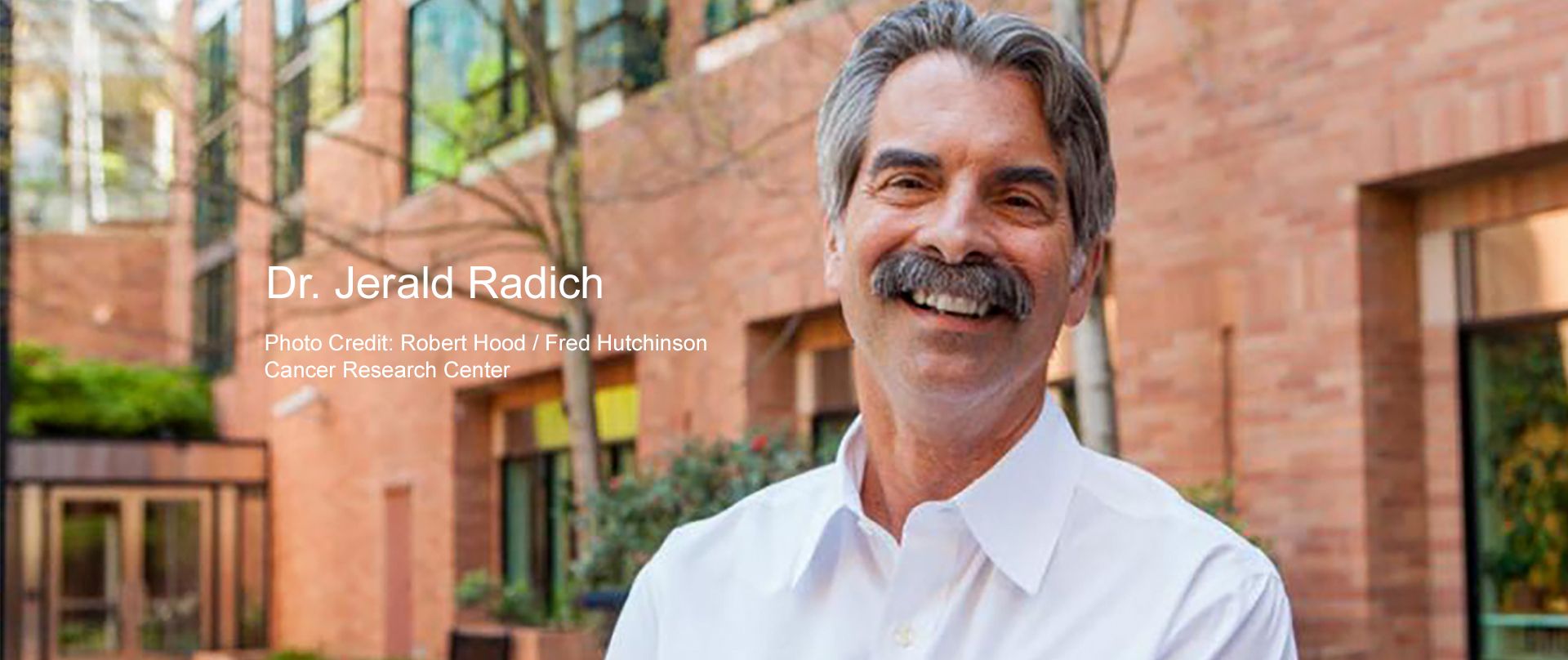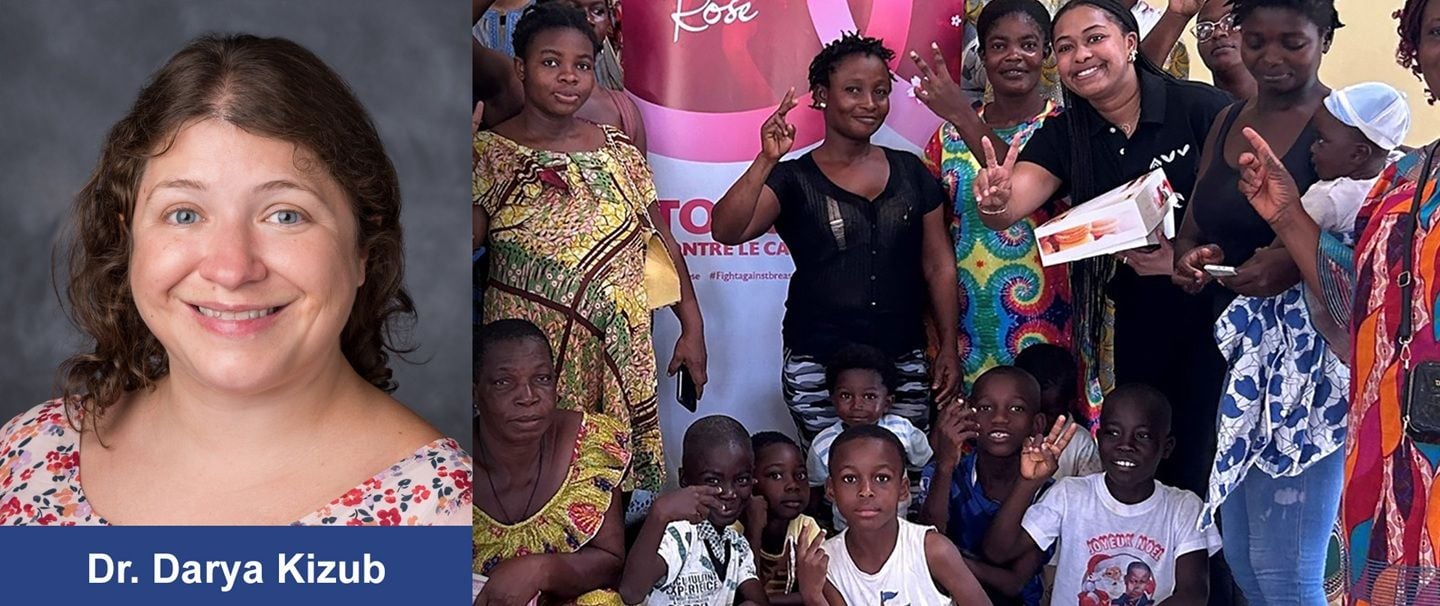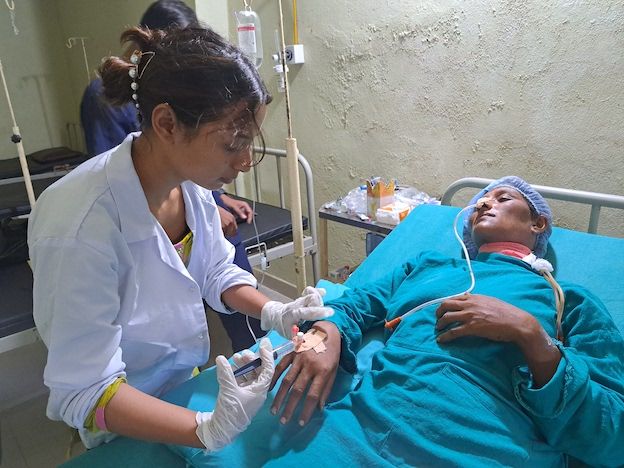Dr. Jerald Radich And The Science Of Hope In Leukemia Treatment
Medically reviewed by Dr. Jerald Radich on 2025-01-13

In the dynamic and ever-evolving realm of oncology, where scientific breakthroughs frequently reshape our understanding of cancer treatment, few figures command as much respect and admiration as Dr. Jerald Radich – who also balances being a biker, a golfer, a tennis player and a wedding officiant who has about a dozen weddings (including an impromptu Amish one) under his belt.
As a leading expert in chronic myeloid leukemia (CML), Dr. Radich has dedicated his career to unraveling the molecular intricacies of this complex disease, striving to transform patient care through innovative research and a commitment to personalized treatment strategies that enhance outcomes for individuals facing leukemia.
His pioneering work at the Fred Hutchinson Cancer Research Center not only sets new standards in leukemia treatment but also addresses critical questions about the “genetics of luck”: why some patients respond to therapies while others do not. By exploring the genetic underpinnings of treatment outcomes, Dr. Radich is charting a path toward personalized medicine, where therapy is tailored to the unique genetic profile of each patient. His profound insights and relentless commitment to advancing oncology exemplify the potential for science to change lives, making him a pivotal figure in the global fight against cancer.
This profile explores Dr. Radich’s journey, his profound impact on leukemia research, and his vision for a future where personalized cancer treatment reshapes the lives and outcomes for patients and their families as effectively as possible.
Early Life And Education
Dr. Jerald Radich grew up in Sonoma, California, a quaint little vineyard town where his home life and family history reflected a rich tapestry of backgrounds – his father from an immigrant family in Yugoslavia and his mother a free-spirited, “Grapes of Wrath” child, who journeyed from Oklahoma to California in search of a better life. His sister was the first in his family to get any college education, and Dr. Radich was first to do any graduate education.
Initially, he gravitated towards literature and fiction writing and pursued a Bachelor of Arts degree from the University of California, San Diego, in 1976. But frequent bouts of illness in his childhood sparked a deep appreciation in him for the healing power of physicians, and sent him to Harvard University, where he earned both a Master of Arts and a Master of Science in Epidemiology from the School of Public Health in 1979.
In 1983, Dr. Radich earned his medical degree from the University of California, Davis (UC Davis). Following his graduation, he completed his residency in Internal Medicine at the University of Washington Affiliated Hospitals, followed by a fellowship in Medical Oncology at the same institution and Fred Hutchinson Cancer Center in 1990.
His experience at Fred Hutch was particularly transformative. “Every day was something new, something that people hadn’t seen before. It was wild. It was like cowboy medicine,” he told Blood Cancer Today (BCT) during an interview. “We were doing our best, but we were seeing things that people hadn’t described before. It was quite a thing – full of invention, excitement, and an emotional roller coaster.”
This blend of rigorous training, interspersed with heady episodes of boundless inspiration, laid the groundwork for his eventual specialization in hematologic malignancies, particularly leukemia.
“It seemed like oncology was where everything came together [for me],” he continued. “Oncology was dealing with life and death. There wasn’t a lot of gray area. Oncology was the distillation of all the intense medicine that I liked. Empathy was the touchstone because most things weren’t going to work out well and you had to be both a scientist and a priest.”
Career And Research Focus
Dr. Radich’s research interests are deeply rooted in the understanding of molecular mechanisms that drive leukemia. His work addresses critical questions about treatment responses, resistance, and the genetic variants that may predict patient outcomes.
At the core of his research is the investigation of the BCR-ABL fusion protein, a product of a genetic translocation that is a hallmark of CML. His laboratory was among the first to demonstrate that monitoring levels of this abnormal protein could provide vital insights into disease progression, enabling earlier detection of minimal residual disease – a concept that has since become a standard in clinical practice.
Under Dr. Radich’s leadership, the Radich Laboratory has employed advanced methodologies such as microfluidic platforms and single-cell analysis techniques to study the nuances of genetic expression and mutations.
This innovative approach allows for a more granular understanding of how specific genetic changes influence treatment efficacy. By identifying genetic markers associated with different responses to therapy, Dr. Radich’s work has the potential to revolutionize how physicians approach treatment plans, moving toward a more personalized model of care.
One of his current projects focuses on “outlier responses” in leukemia patients, examining cases with exceptionally poor or exceptional responses to standard therapies. “Everyone has a story about someone who was expected to do well after treatment but relapsed, and someone who wasn’t expected to do well but stayed in remission,” said Radich in a Fred Hutch spotlight. “If we can predict response, we won’t waste time on treatments that are going to fail and can try other approaches.” By exploring the genetic pathways that govern these divergent outcomes, Dr. Radich aims to uncover new therapeutic targets and enhance predictive capabilities in clinical settings. This work not only holds promise for improving individual patient care but also contributes to the broader scientific understanding of leukemia biology.
Contributions To Global Health
Dr. Radich’s commitment to improving cancer treatment extends beyond the laboratory. He is actively involved with The Max Foundation, a global nonprofit organization dedicated to improving access to cancer care in low- and middle-income countries (LMICs). “The Max Foundation now takes care of about 60,000 to 80,000 patients with CML worldwide,” he told BCT. “They receive free treatment and testing, and if you look at those patients, they have the same lifespan as newly diagnosed patients in Seattle. This is a remarkable arc of a story that arose from luck and happenstance.”
Through initiatives like the Spot On CML partnership, Dr. Radich’s team is working to increase diagnostic testing for CML patients in resource-limited settings. Their goal is to test 365 patients per year, significantly impacting regions such as Mongolia, Nepal, and Tajikistan, where access to vital diagnostics is often limited.
His involvement with The Max Foundation highlights Dr. Radich’s belief that state-of-the-art cancer care should not be confined to affluent regions. By addressing disparities in healthcare access, he advocates for a more equitable approach to cancer treatment, ensuring that all patients can benefit from advancements in medical science.
Awards And Recognition
Dr. Radich’s contributions to the field of oncology have garnered significant recognition. He was awarded the International CML Foundation Award in 2017 and the Washington Global Health Alliance Partnership Award in 2019 for his lab’s work on diagnosing and monitoring CML in the developing world, and the International CML Foundation Janet Rowley Award in 2023 for his work on the biology of CML.
His leadership extends to various esteemed committees and organizations. He has served as chair of the CML Guidelines Panels for both the National Comprehensive Cancer Network and the European LeukemiaNet, where he collaborates with other experts to synthesize the latest research findings into practical clinical guidelines. Additionally, he has held significant roles on the Board of Scientific Counselors at the NIH Genome Research Institute and the National Cancer Institute’s Leukemia Steering Committee.
Looking Ahead
Currently, Dr Radich leads the Laboratory Committee of the NCI AML Precision Medicine Initiative (“myeloMATCH”) and leads the Foundation of the NIH’s program in measurable residual disease in AML.
As he continues his research, he remains dedicated to addressing the pressing challenges in leukemia treatment. His focus on deciphering “clonal evolution” – the process by which cancer cells develop genetic mutations over time – aims to improve our understanding of how leukemia evolves and responds to treatment. By characterizing these time-dependent genetic changes, Dr. Radich hopes to identify new strategies for combating resistant forms of the disease.
Moreover, his laboratory’s efforts to develop cost-effective molecular diagnostic assays reflect his commitment to making advancements accessible to all patients, regardless of their socioeconomic status. This approach aligns with the broader goal of democratizing healthcare and ensuring that every patient has the opportunity to benefit from the latest scientific discoveries.
Conclusion
As Dr. Radich delves deeper into the complex interplay between genetics and treatment outcomes, his vision of personalized medicine, tailored to the unique genetic profiles of individual patients, continues to resonate profoundly with professionals across the field of hematologic oncology, as well as the patients whose lives he touches.
His contributions extend beyond the laboratory; they inspire a collective movement towards a future where hope and healing can flourish, even in the face of one of humanity’s most challenging diseases.

